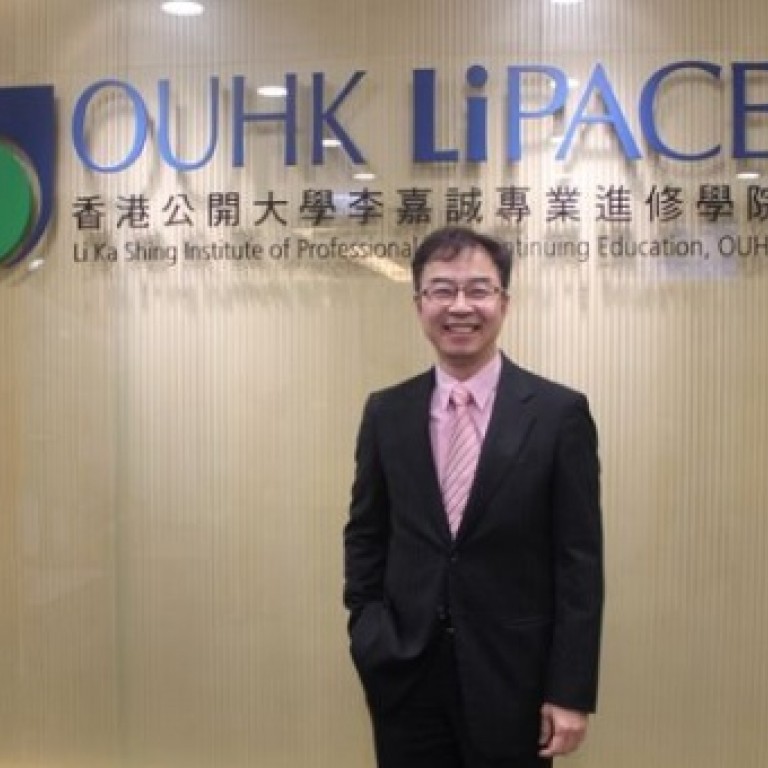
Talking to the top: OUHK LiPACE’s Professor Lui Yu-hon shares his thoughts on a new MBA course
Many career-minded professionals in Hong Kong amass a wealth of specialised, technical knowledge. They then ask themselves what next to keep moving up the career ladder.
This is exactly the type of students the continuing education arm of the Open University of Hong Kong (OUHK) has in mind as it launches an MBA from the University of Birmingham.;
“An MBA can help them move into general management,” says Professor Lui Yu-hon, director of the Li Ka Shing Institute of Professional and Continuing Education (LiPACE) of OUHK. “Several of our other graduate level programmes have helped students change careers or move into management roles within their companies. We believe that the MBA will make a similar, if not bigger, impact on our students' careers.”

Professor Lui Yu-hon, director of LiPACE, started his career in banking and worked as the head of Treasury Department at a foreign financial institution before becoming an academic.
The University of Birmingham programme, run locally by LiPACE, is currently accepting applications for its first intake until 25 May. Those admitted will start the initial module at the end of June.
Although only now available in Hong Kong, the programme itself has a long track record. It was listed 12th in Britain and 85th globally in The Economist's 'Which MBA?' rankings in 2013 and received similarly positive ratings from other UK and European publications.
“In determining which programmes we introduce at LiPACE, we seek the 'blue ocean',” Lui says. “We need to offer something that other [institutions] don't have, and we believe that the Birmingham MBA is one of them.”
Compared with other courses offered locally, he sees advantages in the part-time study mode and the programme’s accreditation from the European Quality Improvement System (EQUIS) and the Association of MBAs (AMBA).
“If the MBA is successful, we will consider further co-operation with the University of Birmingham and see if we can introduce more of their master's level programmes to Hong Kong,” Lui says.
To date, LiPACE has helped to train more than 300,000 students. In the current academic year, there are 2,000 students in full-time programmes and a further 33,000 enrolled in part-time and short courses.
Lui has high expectations for the school's expansion, especially now that a new HK$860 million campus in Kwai Hing has tripled the space available. Birmingham MBA classes will be held at the Kwai Hing campus, which replaces the former facility in Sheung Wan.
“We are aiming for 20 per cent year-on-year growth in the number of students and our tuition income,” Lui says.
He is well aware, of course, that providing continuing education is a competitive business. The funding of LiPACE and the corresponding arms of other universities in Hong Kong depends on a combination of tuition fees and donations.
That, though, has not stopped LiPACE experimenting with the introduction of new programmes, many of which are vocation-driven. For example, sensing opportunity, Lui decided to start courses in wine tasting and professional wine assessment. These have grown in popularity, enabling some students to enter the wine industry as buyers and others to become sommeliers.

OUHK LiPACE's new HK$860 million campus in Kwai Hing.
Lui has also established partnerships with Hong Kong's airlines, tourism industry and law enforcement bodies to develop relevant course content in collaboration with professional experts and potential employers.
“It is very important for us to have a sense for the market – to know that the demand is there and to understand what employers want,” he says.
